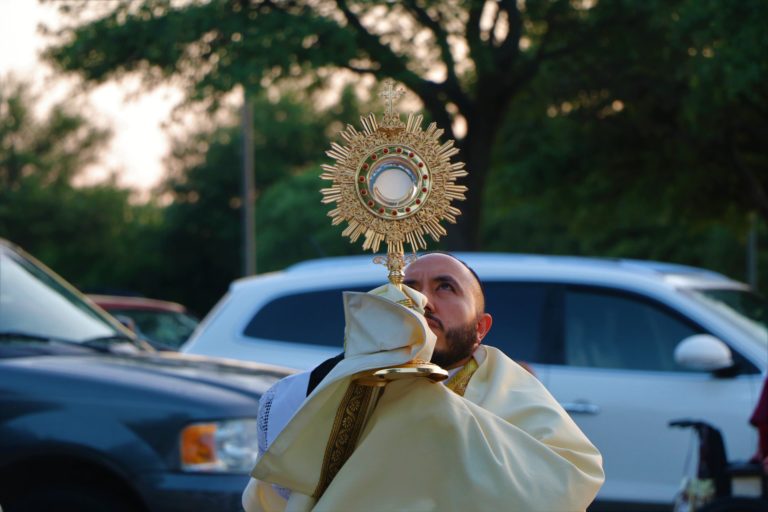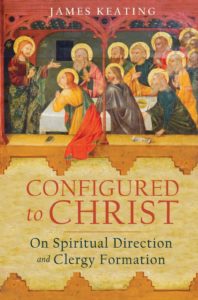By James Keating
Deacon James Keating, PhD has nearly thirty years of experience in the area of clerical formation in the Catholic Church. He is currently Professor of Spiritual Theology at Kenrick-Glennon Seminary in St Louis, MO. He is the author or editor of twenty-eight books on spirituality, morality, and clerical formation, including Configured to Christ: On Spiritual Direction and Clergy Formation.

The Eucharist stands at the core of Catholic imagination and practice. It is the reaching out and down through time of the mystery of Christ’s salvific self-offering in and through the ministry of the priest from within Christ’s own Church. This offer of salvation is such that the Bride of Christ is invited to respond in love, vulnerability, and trust at the deepest level of her being. When fully conscious of this offer the Church, like Mary, is stunned into silence, contemplating all these things in her heart. He died for the Church and yet, through signs, Christ left a way to always and everywhere access His act of love so that the salve of its truth might anoint her. If the Church’s vulnerability before this gift is real, then participation in the Eucharist changes her moral character over time.
It is said that the Eucharist is the place where salvation is offered, and so it is; but is the reception of such salvation by priest and people a conscious appropriation of its healing power or simply a rubrically correct executed act of worship? All worship of God is virtuous, but without the love of participants we know that liturgy can remain an inert reality barely welcomed into the heart. The healing known in the Eucharist is one that Christ grants through His power and our faith. Christ is a healer, “‘Lord, if you will, you can make me clean.’ And he stretched out his hand and touched him, saying, ‘I will; be clean.’” (Matt 8:2–3). Are we eager recipients of the gifts He wants to give us? This personal question is one appropriate to spiritual direction, but on occasion it must be asked both in the forum of worship and in the forum of speculative reflection. In so doing we seek to enlarge our imagination and open our mind to new ways of engaging in study of God’s revelation.
With ever more accurate darts of love the Holy Spirit opens our consciences before God so that deeper and more effective healing can occur; at times His coming is so pure that it causes us to have pain and recoil at the level of intimacy God wishes His Son to achieve in our being. We recoil at our own needed medicine because it will bring about a change, and sin wishes no change to occur. Sin pathologically clings only to the endless boredom of repetitive daily features of the interior life: constant rehearsal of our sinfulness, continued recollection of personal inadequacies, denigrating thoughts about the imperfections of neighbors, resentment toward the mundane horarium of each day, bathing in negative thoughts and moods, existing in cynicism and all manners of interior desires bent on disorder, greed, lust, envy, pride, sloth, anger, and gluttony. All of these desires weigh us down from within and become the signature upon the letter which is our face. The Blood of Christ courses through us to heal the mind of its errors and ideologies unless we have simply reduced worship and its content to an ideology itself; then we have entered the biblical realm of hardness of heart.
For those who have the courage to approach the founts of healing, the Eucharist and the Sacrament of Reconciliation, the interior life begins to lighten. His prese mysteries, and the hope they bring within our souls begin to define the day rather than the boring exchange between the dreary dominating ego and the wispy enthusiasm of affected optimism. Something greater than the mantras of self-help gibberish and post modern syncretism is demanded if spiritual healing is to occur. An encounter must occur. We must be seized with the presence of God. In this presence, perhaps dramatic at first, perhaps not, we appropriate meaning, love, and healing at ever expanding levels of integration throughout our life.
The Eucharist is the encounter with He who does not will anything but mercy and healing. Such an encounter is by its nature ordered toward the healing of interior suffering and, at times, physical cure. We cannot be in union with Christ at the Eucharist without receiving the effects of His virtue, His power to heal, mend, and restore. We are attracted to so much in these short days of living, but the attraction to the Eucharist is the one desire that sets all other attractions within proper proportionality. Without the desire to have Christ’s mysteries lived over again in us by way of the Eucharist, the passing age (see Rom 12:1–2) will have more effect upon our interior life than eternity, opened up for us in the Paschal Mystery.
You Might Also Like
The best clerical formation today prepares men to be divinely loved in their humanity. In Configured to Christ: On Spiritual Direction and Clergy Formation, Deacon James Keating shares what makes a priest or deacon peaceful, personally happy, and—to the extent he keeps receiving the love of God in prayer as a man of interiority and sacrament—a minister of God’s love to his people.
